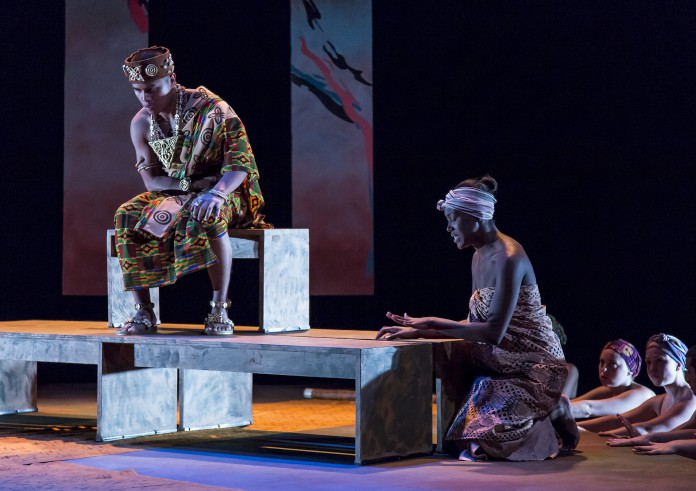Audrey Ronningen
Staff Writer
Photo by David Bazemore
Finding true love doesn’t always guarantee a happy ending, as University of California Santa Barbara’s premiere performance of “Anowa” demonstrated on Friday, May 25. The play, written by Ghanaian playwright Ama Ata Aidoo and performed by UCSB’s Theatre and Dance Department, tells the story of a young woman who rejects suitors to marry an outsider, only to face a tragic end. The rendition of the play featured strong performances and stayed true to the original folk tale’s themes of women’s rights and anti-colonialism.
Although “Anowa” is based on a Ghanaian story, it is applicable in many different contexts, which is part of the reason the Theater and Dance Department selected it for the spring production.
“The beauty of ‘Anowa’ is that it is both an historical folk tale and a modern allegory,” said Director Irwin Appel.
The play is set in late 19th century Ghana, so many of the themes, such as traditional roles of men and women within the village, are relevant to that time period. The title character, played by Erin Pettigrew is described as being very beautiful, but also “different” in that she is strong-willed and independent, qualities which are considered flaws by the other villagers.
When her mother, Abena Badua, describes why she didn’t let Anowa become a priestess, she says that “I want my daughter to be a human,” implying that anything other than the traditional role of wife and mother is alien and inferior. Although circumstances have certainly improved, this idea that a powerful woman should be feared still persists to some degree.
Although “Anowa,” with its heavy themes and somber ending, is definitely a drama, the director rounds it out by including moments of humor. This is done primarily through the dialogue between Anowa’s mother and father, played by Brittany Carriger and Donald Molosi.
One of the main points of conflict in the play is between Anowa and her mother, who feels that she is rejecting her proper role as a woman in that society by marrying Kofi Ako, a trader from outside the village. Both Carriger and Pettigrew made the strained mother-daughter relationship very believable through their often-conflicting scenes of dialogue.
Similarly, the dynamic between Anowa and Kofi Ako, played by Julian Remulla, was a strong point in the production. As the marriage between the two changed for the worse later in the play, the actors were able to smoothly transition from the roles of poor but happy newlyweds to a couple in a completely destructive relationship.
After they elope, it becomes clear that Anowa is unable to have children; additionally, when Kofi Ako becomes involved with the slave trade despite Anowa’s protests, she realizes that he is not the man she thought he was.
The fate of these characters only goes on a downwards spiral from this point in the play. The final act takes place after Kofi Ako has become incredibly wealthy through the slave trade, which has effectively destroyed their relationship and left Anowa mentally unstable as well as guilty for not stopping her husband’s actions.
The play comes to a close after Kofi Ako and Anowa each take their own lives, a conclusion that is tragic but believable, given the circumstances.
What was impressive about this performance of “Anowa” was how the actors made everything seem truly believable, whether it was the good-humored bickering between Anowa’s mother and father, or the heated exchanges between Anowa and Kofi Ako. The production took on the heavy themes within the play and communicated them effectively to the audience.
Michelle Krolicki, a first-year political science major, was impressed with the quality of the play and its constituents.
“[The actors] were able to fashion an atmosphere that kept true to the dark thematic material of African slavery and the traditional conventions of femininity,” said Krolicki.

















